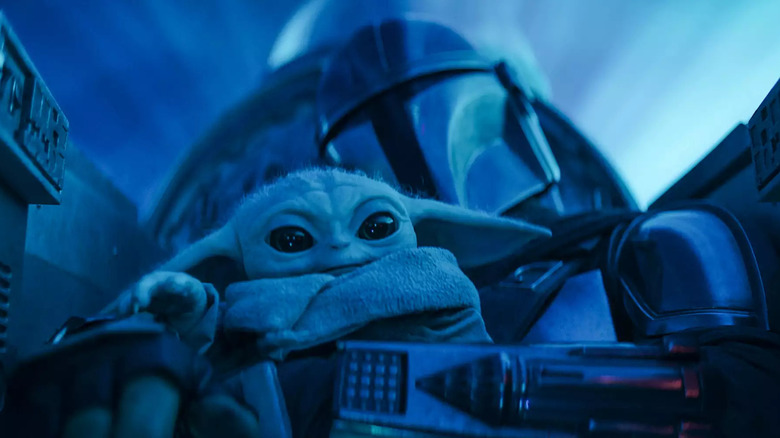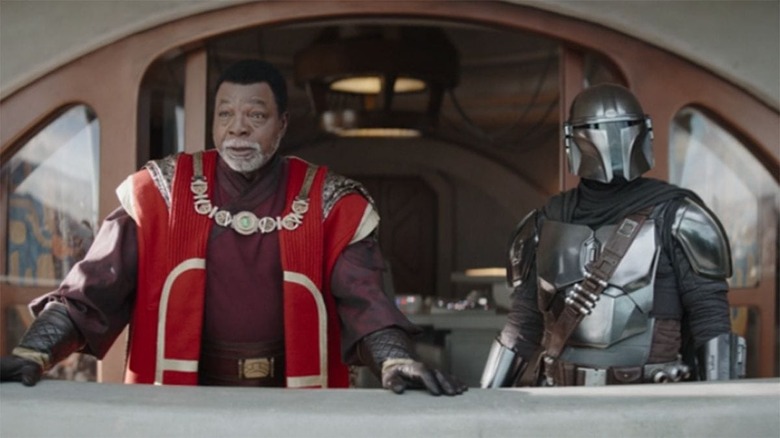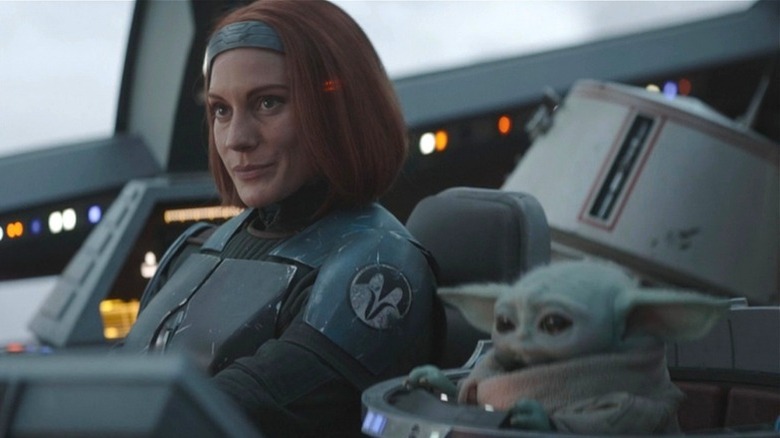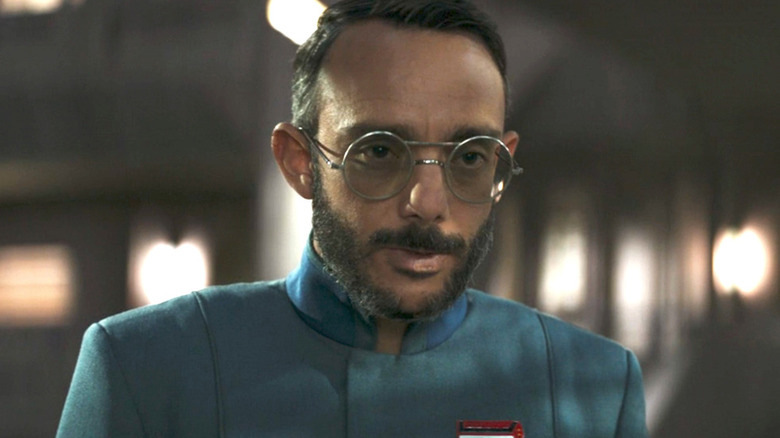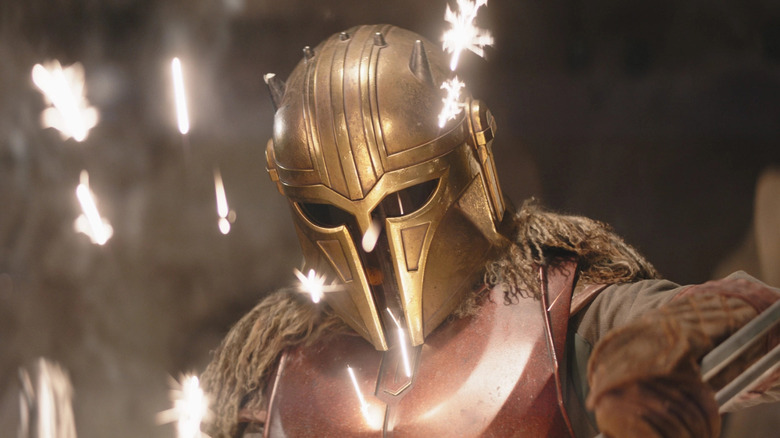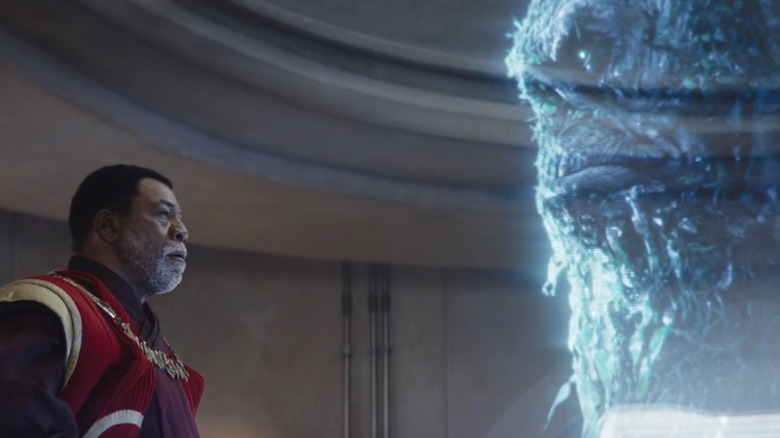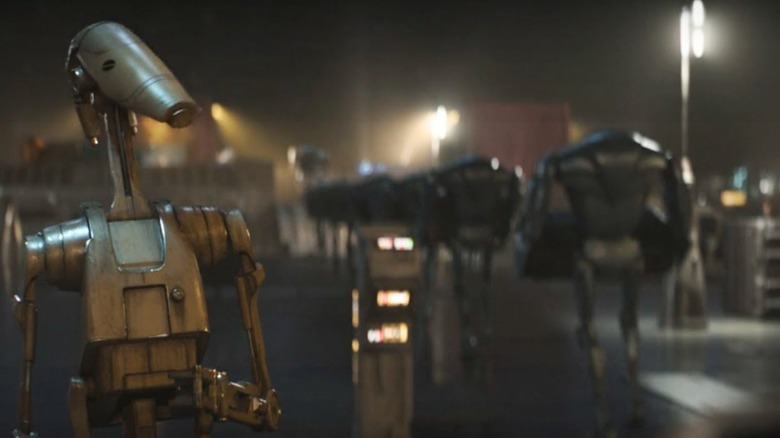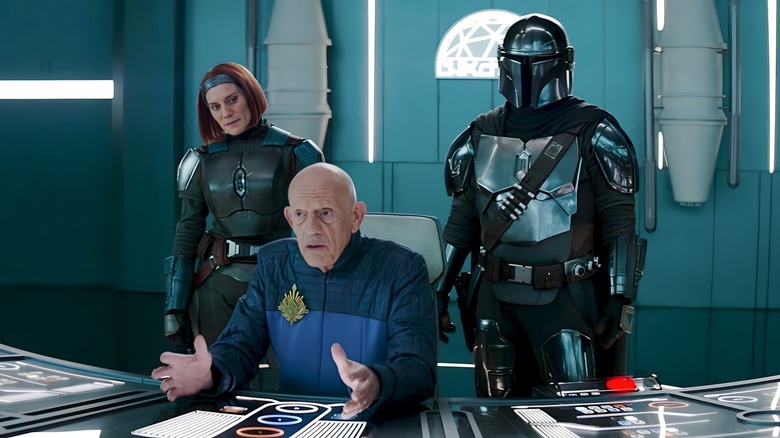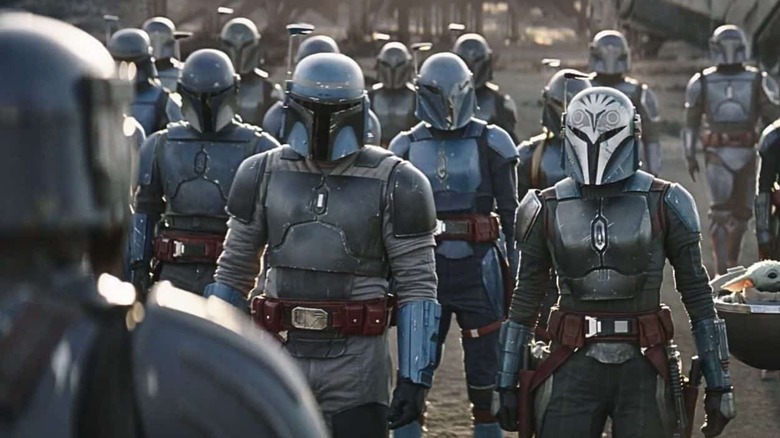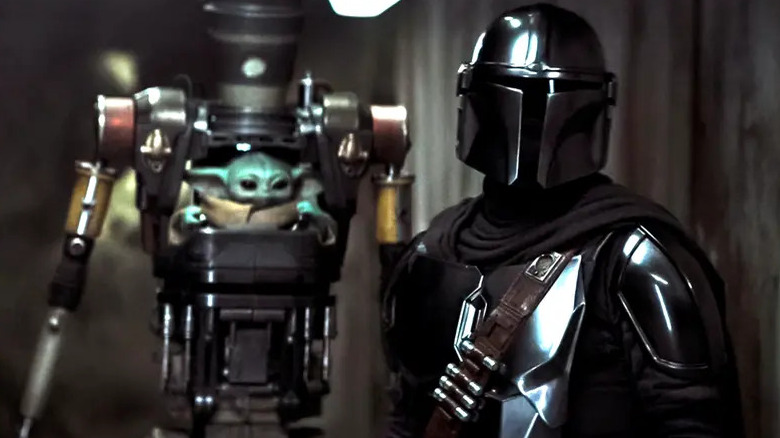Lines In The Mandalorian Season 3 That Mean More Than You Realized
"The Mandalorian" is among the most accessible of all the entries in the "Star Wars" franchise. This Disney+ series, now in its third season, was designed to appeal to fans young and old, existing and new, and casual and committed. Especially when compared to "Andor," in which characters like Maarva, Luthen, and Nemik give stirring, metaphor-heavy speeches, "The Mandalorian" seems pretty literal and elementary. After all, one of its protagonists barely speaks, and the other only coos. And if we're being honest, that's part of what such a wide base of fans appreciates about the show.
But, as "The Mandalorian" has progressed, Din Djarin (Pedro Pascal) and Grogu have woven themselves ever more tightly into the fabric that is "Star Wars" canon. That means, increasingly, what seem like throwaway lines of dialogue can reference significant events from elsewhere on the galaxy's timeline. Viewers often don't need to understand, say, Bo-Katan (Katee Sackhoff) or Moff Gideon's (Giancarlo Esposito) asides in full context; there's just more to the story for anyone who picks up on it.
And, though Mando and company regularly find themselves in situations with life and death stakes, "The Mandalorian" is a little less self-serious than "Star Wars" has typically been as of late. Season 3 contains some fun in-jokes and even some self-owns that the most tuned-in fans will have caught immediately. These are the lines in Season 3 that have more to say than you might think.
If you say so
At the end of the first ever episode of "The Mandalorian" in 2019, Disney+ and Lucasfilm introduced the world to an impossibly adorable tiny green creature known at the time only as The Child. But audiences, who fell in love with the puppeted chararacter as soon as they saw what was in the floating bassinet, had other plans. In short order, and no matter how much eventual merchandise bore his show scripted name on the packaging, The Child became Baby Yoda. Then, midway through Season 2, we (along with Din Djarin ) learned from Ahsoka Tano (Rosario Dawson) that The Child's given name was Grogu. Fans were ... not impressed.
Grogu is, let's face it, not the most aesthetically appealing name for something as cute as whatever Grogu is. Viewers accepted that the kid was Grogu ... but they didn't have to call him that. Baby Yoda is still probably the most commonly used verbiage to describe the show's little star, and it seems Din Djarin has had just as difficult a time getting people to refer to him as Grogu in-world.
In the finale of "The Book of Boba Fett," Peli Motto (Amy Sedaris) doesn't mince her words. "Woah, that's a terrible name! Sorry about that pal, no way am I calling you that," she tells her frequent customers. In "The Mandalorian" Season 3 premiere, it's Greef Karga's (Carl Weathers) turn to be dismissive. "Grogu," Din says, reintroducing his adopted son to his old acquaintance. "Come again," Greef replies. "His name is Grogu," Din repeats. "Oh. If you say so," the High Magistrate responds, then moves on to more pressing business.
I knew quite a few Jedi, you know
Bo-Katan Kryze showed up in two episodes of the second season of "The Mandalorian." The series appeared to be setting her up as an uncomfortable ally and likely rival to Din Djarin. Then, Season 3 unexpectedly elevated Sackoff to co-star and fairly easily resolved much of the tension between her and Mando. One way that she ingratiates herself with him is through her bond with Grogu. She tries to relate to the Force-sensitive being as best and as often as she can.
In Episode 2, Bo-Katan tells Grogu, "I knew quite a few Jedi, you know. I don't know what they taught you about us, but there was a time we actually got along quite well. Fought side by side." Those who've watched "The Clone Wars" and "Rebels" will be able to identify the "quite a few" Jedi Bo-Katan has come into contact with over the years. They include Obi-Wan Kenobi, Anakin Skywalker, Ahsoka Tano, not to mention Kanan Jarrus, and Ezra Bridger.
But Bo-Katan slightly misrepresents her relationship with the Jedi and their history with the Mandalorians. Bo and Ahsoka's partnership gets off to a rocky start, though they eventually come to respect each other. Members of the Jedi Order and Mandalorians have found themselves on the same side before, but they've also waged war against each other in the Old Republic era.
A desperate individual intent on using cloning technology to secure more power for himself
Season 3, Episode 3 ("The Convert") takes an extended diversion to Coruscant, where Dr. Pershing (Omid Abtahi) has been granted amnesty and is adjusting to life as an employee of the New Republic. Both to make his case for mercy and to jog the audience's memory about his role on the show, Dr. Pershing renounces the Empire's use of his research but makes the case for its practical implications. He tells the assembled crowd that organ cloning could've saved his mother and, should he be allowed to continue, could prevent what he calls "needless loss." But he's sure to include this sentiment: "Sadly, my research was twisted into something cruel and inhumane, at the behest of a desperate individual intent on using cloning technology to secure more power for himself."
"The Mandalorian" has been working hard to provide a more satisfying explanation for one of the least successful plot lines in the sequel trilogy — the existence of the previously unheard-of Emperor Snoke and the return of a fatally injured Emperor Palpatine. Presumably, both have something to do with cloning, and that happens to be Dr. Pershing's specialty.
Imperial forces wanted Grogu in the first place because of his Midi-chlorian-friendly DNA, but when Pershing speaks ill of his bosses, it's unclear exactly which "Star Wars" villain he's referencing. The desperate individual could be Moff Gideon, Captain Pellaeon, Admiral Thrawn, or even Palpatine from beyond the grave, however, Episodes 7 and 8 provide more clarity. While the Shadow Council needed Force-enhanced cloning for Project Necromancer, Moff Gideon was busy building a Force-wielding mini-clone army of himself.
The Forge can reveal weaknesses
During Din Djarin, Bo-Katan, and Paz's (Tait Fletcher) mission to rescue Ragnar (Wesley Kimmel) from the raptor nest, Grogu — who'd just won his first Mandalorian training duel — accompanies the Armorer (Emily Swallow) to the Forge. There, she speaks mystically (and somewhat ominously) about her trade, and he experiences a flashback to the night of Order 66. Episode 4 ("The Foundling"), marks a developmental milestone for Grogu. He's growing up, and that means facing an unsafe world both in the chapters to come and in his memories. "Just as we shape the Mandalorian steel, we shape ourselves," she explains. "We refine ourselves through trials and adversity. The Forge can reveal weaknesses."
The smelting and hammering of beskar is actually a great metaphor for personal growth. Done right, the result is nearly indestructible; if done poorly, the armor will fail. The quality of the metal itself is also part of the equation. Din Djarin, Bo-Katan, and Grogu all have pain in their pasts. The traumas they've survived have given them perspective and made them more resilient, but they've also produced vulnerabilities. Weakness is the keyword here — it applies to them individually, and it applies to the splintered Mandalorian clans for whom, the Armorer points out, the Forge is the heart of their culture.
These two symbolic interpretations as well as a third more literal meaning come together in the final episodes. A site near the Great Forge on Mandalore is currently occupied by Imperial forces under Gideon's command. He's mining beskar and crafting Dark Trooper uniforms of its alloy. The Mandalorians will have to overcome their differences — i.e. their greatest weakness — to reclaim the heart of their ancestral home.
He shot first
"Star Wars" has always contained good, bad, and morally complicated characters ... and it's usually that last category that audiences find most interesting. Episode 5 ("The Pirate"), is full of once and currently shady players trying to outmaneuver each other. Greef Karga — a magistrate turned bounty hunter's agent turned magistrate again — is up against Pirate King Gorian Shard as space swashbucklers have overrun Nevarro. When a holoprojection of Shard justifies the invasion because Greef and Mando took out his helmsmen in Episode 1, the High Magistrate defends himself by saying, "He shot first."
This short line will bring to mind another lovable rogue, arguably the lovable rogue in all of "Star Wars," Han Solo. The smuggler and pilot of the Millennium Falcon is at Mos Eisley cantina where he sits across from bounty hunter Greedo, to whom he owes credits. When Han can't pay up, the Rodian verbally threatens to kill him. In the original version of "Star Wars: A New Hope," that's enough for Han to fire his blaster. But in a special edition re-release, George Lucas digitally altered the scene so that it appeared Han Solo acted in self-defense. Who really shot first and which version is superior has become a talking point within the "Star Wars" community. Greef's line is a meta nod to this controversy.
A later exchange between Greef and Mando contains another Han Solo reference. "They've got you outnumbered ten to one," Greef warns. "I like those odds," Mando quips. Han Solo — whose most iconic lines include, "Never tell me the odds" — wouldn't have wanted to know.
You had me at battle droids
In Episode 6 ("Guns For Hire"), Bo-Katan and Mando travel to Plazir-15, a fragile utopia overseen by Captain Bombardier (Jack Black) and his wife, the Duchess (Lizzo). Claiming to be the last direct democracy, Plazir affords its organic citizens a life of leisure. That's because droids — including supposedly reprogrammed Separatist battle droids — do all the labor. Only, the bots can go dangerously haywire, and Bombardier and the Duchess want to hire Bo-Katan and Din Djarin to solve their problem. As a newly appointed leader, it's her decision, but she seeks his opinion. "You had me at battle droids," he says flirtatiously.
There's a sweet and a not-so-sweet subtext to this line, which might sound vaguely familiar. The not-so-sweet meaning has to do with the circumstances under which Din Djarin became a Mandalorian in the first place. In flashbacks, we see that when he was a small boy on the planet Aq Vetina, Separatist Battle Droids ravaged his village, slaughtering most of his people. He only survived because his parents hid him in a hatch (they were killed moments later). Din Djarin's most vivid memory is of that hatch being opened by a battle droid who was about to shoot him before a Mandalorian intervened. He harbors prejudice toward droids, hates battle droids worst of all, and would jump at the chance to take some out of commission.
The line is also a riff on a quote from the workplace rom-com, "Jerry Maguire," in which Renee Zellweger tells Tom Cruise, "You had me at hello." That Mando uses this wording with Bo-Katan (also sort of his co-worker) hints at the developing romantic tension between them in Season 3.
Politics
Bo-Katan and Din eventually get to the bottom of Plazir's malfunctioning droid mystery. Head of Safety, Commissioner Helgait (Christopher Lloyd), is actually a longtime Separatist and admirer of Count Dooku. Honestly, he speaks so condescendingly of the people of Plazir and how utterly lost they'd be without him and droids that his treachery doesn't come as much of a surprise. "I didn't give up to the corrupt Republic, I didn't give up to the Empire, and I won't give up to you," he bellows at his captors.
With his hand hovering over a button, he's about to unleash droid chaos on the planet, but he waxes poet about his viewpoints for a little too long, which gives Bo-Katan a clean shot at him. "Politics," she deadpans as his stunned (but not dead) body falls. Never mind the fact that, as the former and once-again leader of Mandalorian society, Bo-Katan has had to and will again necessarily have to engage in politics.
This one-word line of dialogue is a brief but hilarious bit of meta-commentary on the public's reaction to the prequel trilogy. Though they've been somewhat reclaimed (especially by younger generations), Episodes I-III were roundly criticized for, among other things, being too focused on and dry and convoluted in their depiction of the politics of the era. Many, many minutes of runtime were devoted to, say, trade route disputes between the Republic and Separatists. The franchise has also had to fend off accusations of ideological leanings, some of which are the intention of its creator. Bo-Katan's throwaway delivery of the line, "Politics," is a last laugh of sorts.
It is always our own divisions that destroy us
This is a line that turned out to mean less than fans thought. With its seventh episode title, "The Mandalorian" seemed to tease a late-season mystery. On the whole, the "Star Wars" franchise is pretty ripe for fan theorizing. In this case, the chapter called "The Spies" got fans talking. Notice that the word is plural. One spy makes herself known early on in the episode; Elia Kane (Katy O'Brian) communicates with a holoprojection of Moff Gideon and gives him valuable information about the Mandalorians' alliances with each other and Greef Karga. We don't see Elia again, and as Gideon continues to get the best of the united clans on Mandalore, the prospect of a second spy looms.
When Bo-Katan says, "It is always our own divisions that destroy us," it seems to imply that there's a rat amongst her ranks. Fan theories held that it was either the Armorer or Axe Woves (Simon Kassianides). The former conspicuously has horns on her helmet that resemble the ones on Moff Gideon's faux-Mandalorian headpiece, and she excused herself from the action for a while to shepherd unwell clans people back to another location.
Axe Woves did the same at the end of Season 2, and it felt like the show could've brought him back to prominence just for this reveal. But there was no second spy. Both the Armorer and Axe Woves stay loyal to Bo-Katan. The real surprise as it relates to this line is that the episode and the season have a happy ending. The Mandalorians really are stronger together.
His parents are far from here, if they are even alive
The finale of Season 3 is tense and action-heavy, with a more wholesome-than-expected ending. Having proved himself capable of being a true Mandalorian, fighting alongside his father figure and saving him and Bo-Katan from raging fires with the Force, Din Djarin requests that his status be elevated from Foundling to Apprentice. She agrees that the child is more than capable, but as he cannot yet speak, he cannot officially recite the creed. Mando points to a loophole — his parents could give him permission. The Armorer reminds him, "...his parents are far from here if they are even alive."
Of course, Mando goes on to officially adopt Grogu (now Din Grogu), and the family of two moves to a little house on Nevarro that will serve as their home base whilst they take on off-the-record contract work from the New Republic. But back to the Armorer's line. One of the last lingering threads in "The Mandalorian" is Grogu's true origin story; not where he was on the night of Order 66, but the name of his species and the identity of his parents.
It's possible that Season 4 or subsequent related installments will address this. One fan theory suggests that Yoda and Yaddle could be Grogu's mother and father since the species is so rare and they were both Force-sensitive. The franchise does love a good (or bad) parentage reveal, so it might not be an accident that the Armorer brought it up.
